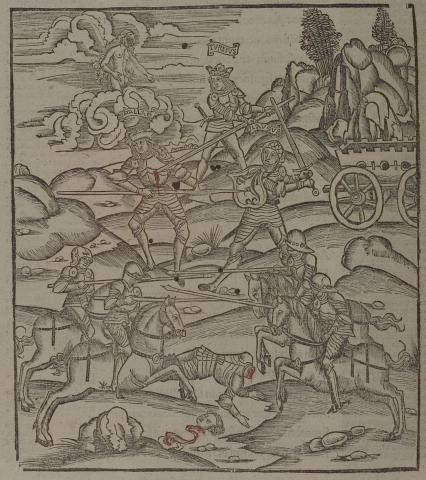CORE VOCABULARY
perterreō, uī, itus, 2, a.: to fill with terror; to affright, dismay, 10.426.
Lausus, ī, m.: an Etruscan chief, son of Mezentius, 7.649, et al.
Abās, antis, m.: 1. The twelfth king of Argos, grandson of Danaus, 3.286. 2. A Trojan, follower of Aeneas, 1.121. 3. An Etruscan, 10.427.
oppōnō, posuī, positus, 3, a.: to place or put before or against, 5.335; oppose, 7.300; present, expose, 2.127; p., oppositus, a, um, placed in the way, opposed, 12.292; opposing, 2.333. (ob and pōnō)
interimō, ēmī, ēmptus, 3, a.: to take from the midst; kill, 10.428. (inter and emō)
nōdus, ī, m.: a knot, 1.320, et al.; of a tree, 11.553; bond, 1.296; coil, 2.220; (fig.), difficult point; center of strife, 10.428.
sternō, strāvī, strātus, 3, a.: to spread out, spread, 1.700; stretch on the ground, strike down, slay, 1.190; cast down, prostrate, devastate, 2.306; make level, smooth, calm, 5.763; spread, cover, 8.719; strew, litter; overthrow, conquer, 6.858; pass. (in middle sense), sternor, ī, to stretch one's self, lie down, 3.509.
Arcadia, ae, f.: the central country of Peloponnesus, 5.299.
prōlēs, is, f.: that which springs forth; offspring, race, progeny, 1.75; lineage, 3.180.
Etrūscus, a, um: adj. (Etrūria), Etrurian, Tuscan, 8.503; subst., Etrūscī, ōrum, m., the Etrurians, Tuscans, 9.150.
ō: (interj. expressing joy, grief, astonishment, desire, or indignation), O! oh! ah! w. voc., 2.281, et al.; w. sī and the subj., oh that, 11.415; sometimes placed after the word to which it relates, 2.281.
Grāī (Grāiī) (dissyll.), ōrum, m.: the Greeks, 1.467, et al.
imperditus, a, um: (adj.), undestroyed, 10.430.
Teucrī, ōrum, m.: the Trojans, descendants of Teucer, 1.38, et al.; adj., Teucrian, Trojan, 9.779, et al. (Teucer)
concurrō, currī (rarely cucurrī), cursus, 3, n.: to run together or at once; crowd around, 12.297; rush, 2.315; rush to conflict, 7.224; rush against a foe; (with dat.), engage, encounter, 1.493.
addēnseō, ēre, and addēnsō, āre, a.: to make compact; close up, 10.432.
nec or neque: (adv. and conj.), and not; neither, nor, 1.643, et al.; in prohibition, 3.394, et al.; neque (nec) — neque (nec), neither — nor, 5.21, et al.; nec — et, or -que, may be rendered neither — nor, 12.801; 2.534; nec nōn, and also, nor less, 6.183; nec nōn et, and also, 1.707.
manus, ūs, f.: the hand, 1.487; freq.; (meton.), action, movement of the hand; work, art, handiwork, 3.486; prowess, heroic deed, action, 2.434; force, violence, 2.645; a collection of persons; a band, crew, troop; an army, 2.29; forces, 5.623; multitude, 6.660; pl., manūs, workmen, 11.329; dare manūs, to yield, 11.558; extrēma manus, the finishing hand or touch, 7.572.
Pallās, antis, m.: 1. A king of Arcadia, great-grandfather of Evander, 8.51. 2. Pallas, son of Evander, 8.104, et al.
īnstō, stitī, 1, n.: to stand on or upon; w. dat., acc., inf., or alone; w. dat., to stand on, 11.529; stand or hang over, 10.196; (w. acc.), to work at, ply work upon, 8.834; (w. inf.), urge on, press on, 1.423; persist, 10.118; (alone), to follow up, press on; pursue, 1.468; struggle, 12.783; be near at hand, approach, threaten, 12.916; to be urgent, important, incumbent, 4.115.
urgeō, ursī, 2, a. and n.: to drive, impel, press forward, 1.111; ply, hasten, 9.489; press, oppress, crush, bear down, 3.579; press around, inclose, surround, hem in, 11.524; weigh upon, oppress, close, 10.745; overpower, 2.653; attack, 10.375; punish, torture, 6.561.
contrā: (prep. and adv.; prep. w. acc.), over against; opposite to, 1.13; against, 5.370; to, 9.280; on the contrary, 12.779; on the other hand, in reply, 1.76.
multum: (adv.), much, greatly, exceedingly, 3.348, et al.
discrepō, uī, 1, n.: to be discordant in sound; (fig.), to differ, 10.434.
fortūna, ae, f.: fortune, destiny, lot, chance, fate, 1.628; success, 10.422; the proper moment, a chance, 12.920; misfortune, calamity, 12.593; personified, 3.53, et al. (fors)
reditus, ūs, m.: a return, 2.17. (redeō)
rēgnātor, ōris, m.: one who reigns; sovereign, lord, 2.779, et al. (rēgnō)
Olympus, ī, m.: Olympus, the name of several mountains in Greece and Asia Minor, the most famous of which was Mount Olympus in the northeastern part of Thessaly; the home of the superior gods; heaven, Olympus, 1.374; referring to the gods, 8.533.

